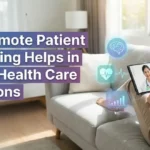New Code G0511 For FQHCs Expands Chronic Care Management

Remote care services are reimbursed for using a variety of codes, both from CMS and private insurers. While most of these codes are particular to the type of remote care being offered to patients, there is one unique code – G0511, used by Federally Qualified Health Centres (FQHCs) and covers a variety of remote care programs.
HCPCS code G0511 is formulated specifically for healthcare organizations such as FQHCs and RHCs (Rural Health Centers). Its official description includes billing for “primary care management,” which includes at least 20 minutes of clinical staff time dedicated to Chronic Care Management (CCM), Principal Care Management (PCM), or Behavioral Health Integration (BHI) services, as directed by a practitioner at the FQHC.
Table of Contents
ToggleWhat Services Does G0511 Cover?
FQHCs are allowed to bill for certain remote monitoring services using G0511 from Jan 2024. These services include RPM (Remote Patient Monitoring), RTM (Remote Therapeutic Monitoring), CCM (Chronic Care Management), and Principal Care Management (PCM). CMS included G0511 for RPM in its 2024 Physician Fee Schedule (PFS).
Remote care services covered by G0511 can address various chronic diseases, such as:
- High blood pressure (Hypertension)
- Heart failure (CHF)
- Chronic kidney disease (CKD)
- Chronic obstructive pulmonary disease (COPD)
- Obesity
- Diabetes
With many patients having multiple chronic conditions, Federally Qualified Health Centers (FQHCs) and Rural Health Clinics (RHCs) can make a big difference by offering remote care programs. The inclusion of G0511 for Remote Patient Monitoring (RPM) and Chronic Care Management (CCM) opens up significant opportunities for improving patient outcomes.
Physicians Fee Schedule (PFS) Rules for Billing RPM
Federally Qualified Health Centers (FQHCs) have the green light to use the G0511 code more than once within a single month, provided they complete the coding requirements for each service without any overlap.
This means that FQHCs can deliver all the services covered by G0511, ensuring they meet the specific requirements for each service and bill for them separately.
Expanding Care at FQHCs With Code G0511
G0511, like other FQHC codes help keep expenses down. G0511 includes three CPT codes: 99490, 99487, and 99484. This means that reimbursement for both chronic care management and behavioral health integration at the same.
G0511 was revised in the 2024 PFS Final Rule to cover the new CHI and PIN programs, in addition to CCM, PCM, RPM, and RTM. According to the Final Rule, FQHCs and RHCs can bill the code more than once per calendar month if the underlying service standards are completed.
Can RHCs Bill Various Care Programs With G0511?
Yes. G0511 can now be billed for multiple instances of various care management services in a month if, according to Medicare, “the resource costs associated with each of the services are separately accounted for.”
However, the 2024 Final Rule does not specify a maximum number of times the code can be filled in a single month.
HealthArc’s Digital Platform Simplifies Care Management For FQHCs
With G0511 applying to multiple instances of remote care, FQHCs can do more with remote monitoring. By keeping a close watch on the riskiest patients, healthcare can gather important data about their conditions and help them get better care.
HealthArc is your reliable partner in enhancing patient outcomes and engagement using digital health platform and RPM software designed to scale your healthcare outcomes.
Please request a free demo to learn about FQHCs billing codes. Also, feel free to talk to our team at +201 885 5571 for any queries about the CPT Code G0511.
Frequently Asked Questions (FAQs)
G0511 is a general care-management code for FQHCs and RHCs that captures 20 minutes or more of clinical staff time in a calendar month under practitioner direction for services such as CCM and BHI.
In 2024, G0511 may be used to bill care-management services including CCM, PCM, BHI, and—per 2024 policy updates—RPM and RTM.
Beginning January 1, 2025, G0511 is being unbundled. FQHCs/RHCs are directed to bill the individual CPT/HCPCS codes for each care-management service (for example, CCM, PCM, RPM, RTM, BHI).
Yes. Facilities may continue billing with G0511 through September 30, 2025, while systems and workflows are updated. Once you switch to individual codes, use that approach consistently.
Yes—multiple billings in a month are allowed when each billed unit reflects distinct, non-overlapping time that fully meets requirements. Do not double-count minutes across services.
Clinical staff or auxiliary personnel under the general supervision of the billing practitioner may furnish qualifying time. Maintain clear documentation of activities and minutes.
For 2024, yes. Starting in 2025, bill the specific RPM/RTM CPT codes (including add-ons when applicable) rather than G0511.
Transitional Care Management can be billed in conjunction with other care-coordination services when all requirements are met. In 2025, TCM is billed under its own CPT codes (not via G0511).
Track time logs, care-plan elements, clinical staff activities, communications and escalations, and evidence of practitioner oversight. Align documentation to the service furnished (e.g., CCM vs. BHI).
No. Use one method consistently during the transition window: either continue with G0511 through September 30, 2025, or move to the individual codes starting January 1, 2025.
G0512 is used for the psychiatric Collaborative Care Model (CoCM) and remains separately payable, with distinct time and service requirements from G0511.
G0511 may be billed multiple times per patient per month when each unit satisfies all service requirements without overlapping minutes. Please refer to your MAC’s instructions for any local nuances.
Yes. Patient consent is required for these non–face-to-face services. Consent may be obtained by auxiliary personnel under general supervision, consistent with program rules.
Yes. The transition to billing individual CPT/HCPCS codes applies to both RHCs and FQHCs, with the same option to continue using G0511 through September 30, 2025.
Facilities will use the applicable code families for care coordination and management (for example, CCM, PCM, APCM/CPM, General BHI, RPM, RTM, CHI, PIN, PIN-PS) and any related add-on codes, as appropriate.
Overlapping minutes—counting the same staff time toward two services—or changing billing methods mid-period. Keep separate, auditable time records and follow a single approach during the transition.
Yes. While national policy applies broadly, operational details can vary by MAC. Please ensure you check any regional instructions regarding edits, examples, or documentation preferences.
Most Recent Blogs
Categories
Related Blog
- February 4, 2026 | Read Time: 16 mins
The Most Common Chronic Diseases and How to Manage Them Effectively
Chronic diseases are one of the biggest problems that healthcare systems around...
Learn More- December 22, 2025 | Read Time: 23 mins
CMS ACCESS is Advancing Chronic Care through Effective, and Scalable Solutions
Introduction: Why Chronic Care Needs a New Model Chronic disease management has...
Learn More- December 20, 2025 | Read Time: 10 mins
Coverage Gaps ACCESS Aims to Fill: What Traditional Medicare Payment Left Behind
Medicare paid for visits but not for care. For a long time,...
Learn More


